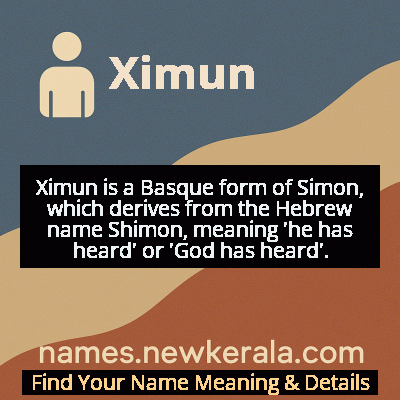Ximun Name Meaning & Details
Origin, Popularity, Numerology Analysis & Name Meaning of Ximun
Discover the origin, meaning, and cultural significance of the name XIMUN. Delve into its historical roots and explore the lasting impact it has had on communities and traditions.
Name
Ximun
Gender
Male
Origin
Hebrew
Lucky Number
9
Meaning of the Name - Ximun
Ximun is a Basque form of Simon, which derives from the Hebrew name Shimon, meaning 'he has heard' or 'God has heard'.
Ximun - Complete Numerology Analysis
Your Numerology Number
Based on Pythagorean Numerology System
Ruling Planet
Mars
Positive Nature
Generous, passionate, energetic, and humanitarian.
Negative Traits
Impulsive, impatient, moody, and can be overly emotional.
Lucky Colours
Red, maroon, scarlet.
Lucky Days
Tuesday.
Lucky Stones
Red coral, garnet.
Harmony Numbers
1, 2, 3, 6.
Best Suited Professions
Military, sports, philanthropy, leadership roles.
What People Like About You
Courage, energy, leadership, generosity.
Famous People Named Ximun
Ximun Aire
Linguist and Cultural Activist
Prominent figure in Basque language preservation and cultural revival movements
Ximun Fuchs
Musician
Influential Basque folk musician who helped popularize traditional Basque music internationally
Ximun Haran
Writer and Poet
Award-winning Basque author known for blending traditional storytelling with modern literary techniques
Ximun Etxeberria
Academic
Professor of Basque Studies who has published extensively on Basque linguistics and cultural history
Name Variations & International Equivalents
Click on blue names to explore their detailed meanings. Gray names with will be available soon.
Cultural & Historical Significance
Extended Personality Analysis
Individuals bearing the name Ximun typically exhibit a complex blend of spiritual depth and cultural consciousness that reflects their name's rich heritage. They are often characterized by exceptional listening skills and thoughtful responsiveness, embodying the meaning 'God has heard' through their attentive approach to relationships and problem-solving. Ximuns tend to be deeply connected to their roots while maintaining an open-minded perspective toward the modern world. This balance makes them excellent mediators who can bridge cultural divides and facilitate understanding between different groups. Their personality often includes a strong sense of responsibility toward preserving traditions and knowledge, combined with innovative thinking about how to adapt these traditions to contemporary contexts. Many Ximuns demonstrate quiet leadership qualities, preferring to lead through example and consensus rather than authority. They typically possess emotional intelligence that allows them to understand unspoken needs and concerns, making them valued friends, partners, and community members. This combination of traditional wisdom and modern adaptability creates individuals who honor the past while actively shaping the future.
Modern Usage & Popularity
In modern times, Ximun has evolved from a traditional regional name to a symbol of cultural revival and identity affirmation. While its usage remains concentrated in the Basque Country and Navarre, the name has gained recognition beyond these regions as interest in unique, meaningful names has grown globally. Since the 1980s, Ximun has experienced a steady increase in popularity among Basque families, particularly those actively engaged in language revitalization and cultural preservation efforts. The name appeals to modern parents seeking distinctive options that carry deep historical and spiritual significance without being overly common. In recent years, Ximun has also appeared in international contexts as Basque diaspora communities maintain cultural connections across generations. Social media and global connectivity have further increased awareness of the name, though it remains relatively rare outside Basque cultural circles. Current naming trends show that Ximun is often chosen by educated, culturally-conscious parents who value both uniqueness and meaningful heritage in their children's names.
Symbolic & Spiritual Meanings
The name Ximun carries multiple layers of symbolic meaning that extend far beyond its literal translation. Primarily, it symbolizes the profound concept of divine attention—the assurance that one's prayers, hopes, and struggles are witnessed and acknowledged by higher powers. This makes the name emblematic of faith, hope, and spiritual connection across generations. Symbolically, Ximun also represents cultural endurance and resistance, embodying the survival of Basque identity through centuries of political and linguistic challenges. The name serves as a living testament to cultural preservation, symbolizing how ancient traditions can maintain their distinctive character while adapting to changing circumstances. Additionally, Ximun symbolizes the bridge between different worlds: between the sacred and secular, between ancient traditions and contemporary life, between local identity and global consciousness. Those who bear this name often become symbolic representatives of cultural continuity, carrying forward both the spiritual legacy of 'hearing and being heard' and the cultural legacy of maintaining unique identity in a homogenizing world. This rich symbolic tapestry makes Ximun a name that speaks to both personal spirituality and collective cultural memory.

